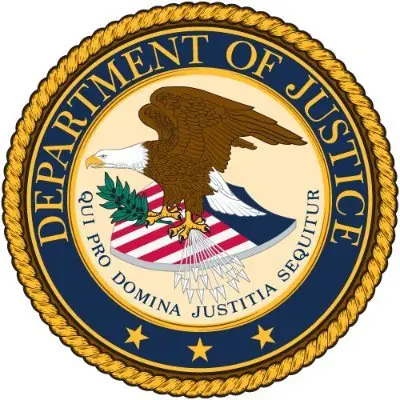Three Nigerian nationals have been indicted in the United States of America for their roles in a transnational internet-enabled investment fraud scheme, U.S. Attorney Philip R. Sellinger announced in a statement.
The United States Attorney’s Office for the District of New Jersey on Wednesday, December 11, 2024, unsealed charges against the Nigerian men, Augustine Chibuzo Onyeachonam, 30, Stanley Asiegbu, a/k/a “Stanislaus,” 37, and Chukwuebuka Nweke-Eze, 29,
The defendants, “all of the Federal Republic of Nigeria, were each charged by Indictment with one count of wire fraud conspiracy (Count One), two counts of wire fraud (Counts Two and Three), one count of securities fraud conspiracy (Count Four), one count of identity theft conspiracy (Count Five), and four counts of aggravated identity theft (Counts Six through Nine), the statement read.
“These defendants not only defrauded dozens of victims out of millions of dollars of their hard-earned money, but they also impersonated licensed FINRA representatives, spoofed their websites, and misappropriated the seal of the SEC to carry out their fraud,” U.S. Attorney Sellinger said.
“My office will continue to work with our law enforcement partners to pursue these kinds of scammers no matter where in the world they are and seek justice for their victims.”
According to the Indictment:
From at least as early as in or around 2018 through the present, Onyeachonam, Asiegbu, Nweke-Eze, and others (the “Conspirators”) orchestrated an internet-enabled fraud scheme that targeted victims throughout the United States, including in the District of New Jersey. As part of the fraud scheme, the Conspirators impersonated dozens of individuals registered as broker-dealers with the Financial Industry Regulatory Authority (“FINRA”) and used those stolen identities to solicit investments from members of the public through fraudulent public-facing websites.
The fraudulent, or “spoofed”, websites were registered in the names of the impersonated victim brokers and often included genuine credentials, such as CRD numbers, associated with the victim brokers. At times, the spoofed websites also included links to: (1) the FINRA website associated with the victim brokers that allowed any member of the public to view the victim brokers’ employment history, certifications, licenses, or prior violations; and (2) fake social media accounts created by the Conspirators in the names of the victim brokers. At times, the spoofed websites also displayed, without authorization, the seal of the U.S. Securities and Exchange Commission (“SEC”). The Conspirators would further use the SEC seal in email communications with victims.
The Conspirators lured victims of the fraud scheme to the spoofed websites by touting the services of the victim brokers in the comment sections of online articles or videos discussing financial and cryptocurrency investment-related topics. At times, the Conspirators would include links to one or more of the spoofed websites.
When a fraud victim visited a spoofed website, he or she was directed to communicate with an individual they believed to be a legitimate broker-dealer by contacting a telephone number or email address listed on the spoofed website.
The Conspirators, posing as the victim brokers, then communicated with fraud victims and, among other things: (1) told fraud victims that their money would be invested in various stocks and cryptocurrencies; and (2) guaranteed fraud victims returns on their investments of up to 25%. The Conspirators used voice-changing software applications to impersonate certain female victim broker dealers when communicating by telephone.
When a fraud victim decided to invest money with one of the Conspirators posing as a victim broker, the fraud victim was told to: (1) open an account at a particular cryptocurrency trading platform; (2) purchase cryptocurrency assets through that platform; and (3) send the cryptocurrency assets to a particular cryptocurrency wallet address for the purpose of investment. In reality, the funds transferred by the fraud victims to the Conspirators were not invested but were stolen by the Conspirators. At times, fraud victims’ funds were stolen directly from the account(s) opened by them at a particular cryptocurrency exchange.
As part of the fraud scheme, the Conspirators further created fraudulent online investment platforms that falsely displayed monthly returns associated with the fraud victims’ investments. A fraud victim visiting one of the fraudulent investment platforms typically would observe substantial returns on their investment. At times, when a fraud victim requested to withdraw funds from their account, they would be asked by the Conspirators to pay additional money in fees or taxes to withdraw the funds. After paying these fees, the funds would still not be released.
In total, the Conspirators caused dozens of fraud victims to transmit funds that they believed to be for investments in the aggregate amount of at least approximately $3 million.
The wire fraud conspiracy charged in Count One carries a maximum potential penalty of 20 years in prison and a $250,000 fine; the wire fraud charged in Counts Two and Three of the Indictment each carry a maximum potential penalty of 20 years in prison and a $250,000 fine, the conspiracy to commit securities fraud charged in Count Four of the Indictment carries a maximum potential penalty of 20 years in prison and a $250,000 fine; the conspiracy to commit identity theft charged in Count Five of the Indictment carries a maximum potential penalty of 15 years in prison and a $250,000 fine; and the aggravated identity theft counts charged in each carry a mandatory minimum sentence of two years and a $250,000 fine.
The U.S. Securities and Exchange Commission today filed a civil complaint against all three defendants based on the same conduct.
U.S. Attorney Sellinger credited special agents of the FBI – Newark Atlantic City Resident Agency, under the direction of Acting Special Agent in Charge Nelson I. Delgado, with the investigation leading to the indictment.
The government is represented by Assistant U.S. Attorneys Anthony P. Torntore and Andrew Kogan of the U.S. Attorney’s Office Cybercrime Unit in Newark.
The charges and allegations contained in the indictment are merely accusations, and the defendant is presumed innocent unless and until proven guilty.

